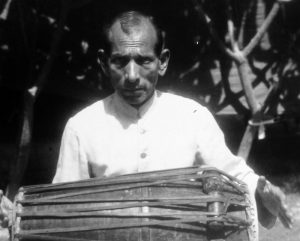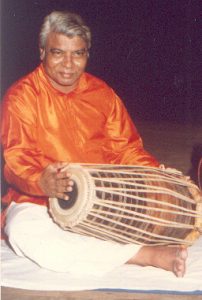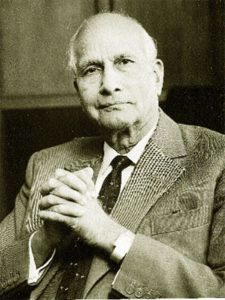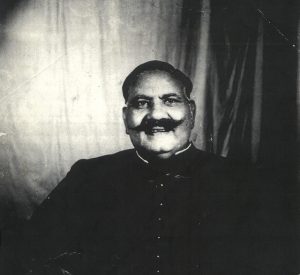| Told by | Pt. Manilal Nag |
| Obtained by | Prof. Sanjoy Bandopadhyay |
| Date | 12 February, 2015 |
| Place | Residence of Pt. Manilal Nag, 13G Gobinda Mondal Lane, Kolkata 700002 |
| About the speaker | Manilal Nag is a renowned sitar player and an exponent of the Bishnupur Gharana of Bengal. His sitar recitals have been featured in many National Programmes of Music & Akashvani Sangeet Sammelan since 1954. He is a recipient of several prestigious awards including Sangeet Natak Akademy Award in 2001 and
Government of West Bengal’s Highest Civilian Award, Banga Bibhushan in 2015. |
| Tags | Vishnupur, Bishnupur, Bankura, Gobinda Chandra Nag, Gokul Nag, Nafar Chandra Nag, Bauridas Nag, Manilal Nag, Mita Nag, Jadu Bhatta, Yadu, Ramprasanna Banerjee, riyaz, litening, vocal, chikari, string, jhala, morning, afternoon, evening, night, north Calcutta, Kolkata, Bagbazar, Shankar Ghosh, Shyamal Bose |
| Language | Bengali |
Pt. Manilal Nag speaks:
English version
Pt. Manilal Nag Talks on His Musical Lineage and Some Tips on Riyaz
Our forefathers had their ancestral home in the town of Bishnupur and later on they settled in the town of Bankura. My grandfather Gobinda Chandra Nag lived in Bankura town only, where my father Gokul Nag was born. I am the fifth generation in my family where music began in an amateurish way since my great grandfather Nafarchandra Nag’s time. His son was Bauridas Nag. My grandfather was the son of Bauridas.
Bishnupur was then a great seat of music. I heard a story about Jadubhatta, who was singing Dhrupad when all activities in the town literally came to a halt. The court proceedings closed as everyone flocked to listen to Jadubhatta.
My father, as a little boy was playing sitar before an audience in Bankura, when his would-be guru Ram Prasanna Bandyopadhyay heard him. He was impressed and accepted my father as his disciple.
My father was always very very strict as a teacher. If I remember his day to day life I saw him immersed in music, in sitar playing, almost all the while. But when he taught me, he was very strict. As a child, I was naturally fond of playing. I used to run out of doors to play with my friends. My father caught hold of me by the ears and made me sit for riyaz.
He sat before me with the tabla. He himself played the tabla and put me to practice for 8 to 10 hours a day. If I ever asked him to show me some technique by the hand he used to insist me that I listen and try to imbibe the sound. “Listen and play, why should I point out?”, he rebuked.
I later on realized how this training of the ears had been a sort of boon for me. In my later years it was so true that I regularly listened to vocal music and imitated the expressions by exploring different techniques on the instrument.
When I am asked how my reputation in playing so singular a jhala came about, I don’t think that there was any special technique behind the practice. I played the 4 stroke Da chi chi chi in a regular tempo foe a long time, emphasizing the third syllable every time, da chi chi chi and so on.
When asked how I could play taans in so fast a tempo, and how it remained melodious all through, I just remember that I practiced a lot of paltas and meends for hours. Another thing, my father was very particular regarding my riwaz with the table. Unlike today when it is difficult to find a laydaar tabla player even once a week for practice, there were many table players in my younger days who simply came to practice with us. They were not renowned artists but they came with their love for music. Four tabla players a day, someone in the morning, another one in late morning, may be again in the afternoon and in the evening. And this went on for days without a break, you could say almost all the days in a year, so that the laya would just get ingrained in your reflex system. Tehais would pop up spontaneously without preparatory rehearsals before concerts. Such tabla players were there during my childhood and boyhood days in Uttarpara, where we lived before coming to our Bagbazar home.
In Bagbazar, Shankarda (Pandit Shankar Ghosh), Shyamalda (Pandit Shyamal Bose) used to come regularly at our home during those early years of my career. Then we used to practice at a stretch for three to four hours.
Paraphrased in English by Mita Nag
Data processed at SAP-DRS Lab, Department of Instrumental Music, Rabindra Bharati University.




